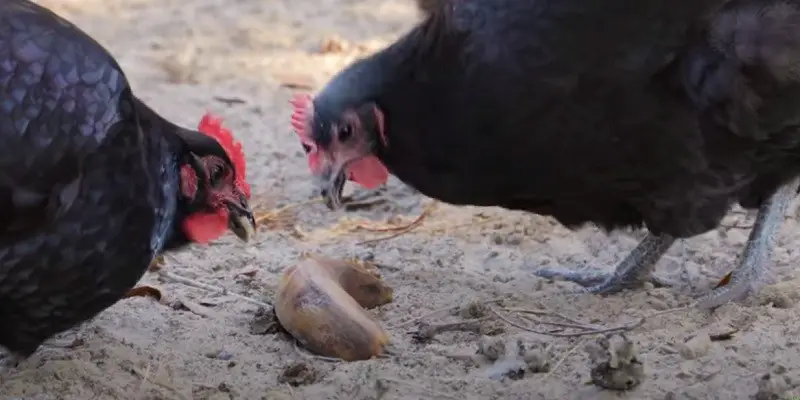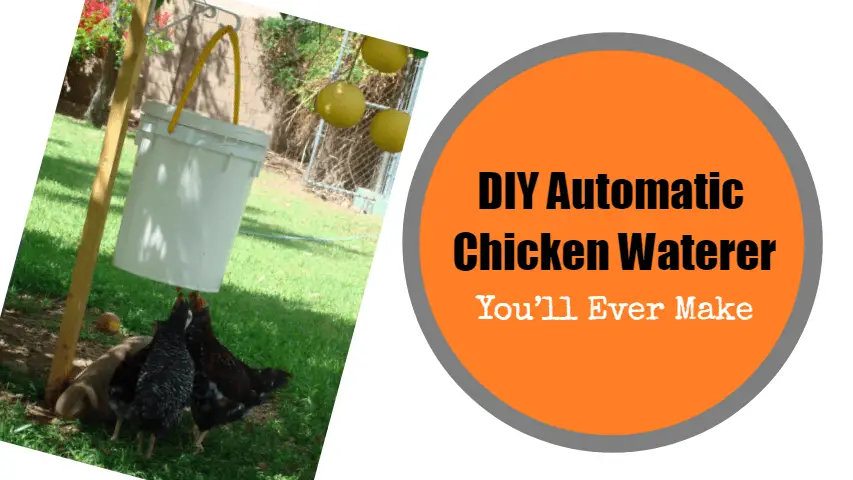Last Updated on November 21, 2023 by Pauline G. Carter
Yes, chickens can eat banana peels, but they may not consume them without preparation. Banana peels are fibrous and chickens do not have teeth, so they may have difficulty tearing and consuming the peel.
However, with some prepping, such as chopping or blending the peel into small pieces, chickens can safely consume them. It is important to note that if bananas have been sprayed with pesticides, it is advisable not to feed them to chickens.
Commercially grown bananas are often sprayed with pesticides, which can be harmful to chickens. Therefore, it is recommended to use organic bananas or wash the peel thoroughly before feeding it to the chickens.
Chicken Dietary Preferences
When it comes to keeping chickens, understanding their dietary preferences is crucial for their overall health and well-being. Chickens have specific dietary requirements that need to be met in order for them to thrive. This includes providing them with a balanced diet that consists of a variety of foods rich in essential nutrients. In this article, we will explore the importance of a balanced diet for chickens, the common foods in a chicken’s diet, and the dietary no-nos to avoid. Specifically, we will tackle the question: Can chickens eat banana peels?
Just like humans, chickens require a balanced diet to stay healthy and productive. A balanced diet for chickens ensures that they receive all the necessary nutrients, vitamins, and minerals they need. This helps support their immune system, promote healthy growth and development, and enhance egg production.
To provide a balanced diet for your chickens, it’s important to offer a combination of grains, proteins, fruits, and vegetables. This ensures that they receive the right amount of carbohydrates, proteins, fats, vitamins, and minerals to meet their nutritional needs.
Chicken feed that is specifically formulated for their nutritional needs is the foundation of a chicken’s diet. It typically consists of a mix of grains, such as corn, wheat, and barley, as well as other ingredients that provide the necessary vitamins and minerals.
In addition to their regular feed, chickens also enjoy a variety of other foods. Some common foods that chickens can eat include:
- Fruits: Chickens enjoy fruits, such as strawberries, apples, grapes, watermelon, cherries, and pears. These fruits are not only tasty but also provide additional vitamins and antioxidants.
- Vegetables: Leafy greens like lettuce, cucumbers, carrots, and cabbage are great options to include in a chicken’s diet. These vegetables are not only nutritious but also provide hydration.
- Proteins: Chickens need protein to support their growth and egg production. They can get their protein from sources such as mealworms, earthworms, cooked eggs, and even small fish.
While there are many foods that chickens can enjoy, there are also some dietary no-nos to be aware of. It’s important to avoid feeding chickens certain foods that can be harmful to their health. Some examples of foods to avoid include:
- Chocolate, citrus fruits, and avocado: These foods contain substances that can be toxic to chickens and should be avoided.
- Coffee and tea: Chickens are highly sensitive to caffeine, so it’s best to avoid giving them coffee or tea.
- Spinach, rhubarb, tomato, and eggplant leaves: These vegetables contain compounds that can be harmful to chickens when consumed in large quantities.
- Raw potatoes and green potato skins: Raw potatoes and green potato skins contain solanine, which is toxic to chickens. It’s important to thoroughly cook potatoes before feeding them to chickens.
- Uncooked beans and rice: Raw beans and rice contain toxins that can be harmful to chickens. It’s crucial to ensure that these foods are properly cooked before offering them to chickens.
By understanding the importance of a balanced diet for chickens, providing them with common foods that they enjoy, and avoiding the dietary no-nos, you can ensure that your chickens stay healthy and happy.
While chickens can technically eat banana peels, it’s unlikely that they will consume them without some preparation. Banana peels are very fibrous and may be difficult for chickens to digest. It’s best to offer chickens a variety of other fruits and vegetables that are more easily digestible and provide greater nutritional value.

Credit: www.youtube.com
Incorporating Fruits In The Coop
Chickens can technically eat banana peels, but they may not be interested in them without some preparation. Since chickens lack teeth, they can only tear at food and may not successfully consume an entire peel.
Nutritional Benefits Of Fruits For Chickens
Fruits are not only a delightful treat but also a nutritious addition to your chicken’s diet. Incorporating fruits into their diet can provide a range of essential vitamins, minerals, and antioxidants, promoting overall health and well-being. Fruits are particularly beneficial for supporting their immune system, improving egg production, and enhancing feather quality. Some fruits, such as bananas, are also rich in potassium and fiber, which can aid digestion and prevent nutrient deficiencies. By introducing fruits into the coop, you can ensure that your feathered friends receive a well-rounded and wholesome diet.
How To Safely Introduce Fruits
Introducing fruits to your chickens’ diet should be done gradually to prevent any digestive issues or upset. Start by offering small portions of fruits as a treat, observing how they react and ensuring they tolerate them well. It’s important to cut the fruits into manageable sizes, making it easier for chickens to eat and reducing the risk of choking. Additionally, make sure the fruits are fresh and free from any signs of spoilage or molds. By following these simple steps, you can safely introduce fruits into their diet and avoid any potential negative effects.
Popular Fruits For Chickens
When incorporating fruits into the coop, it’s essential to choose ones that are safe and beneficial for chickens. Below are some popular fruits that your feathered friends will enjoy:
| Fruit | Nutritional Benefits |
|---|---|
| Strawberries | High in vitamin C, antioxidants, and fiber |
| Apples | Rich in vitamins A and C, as well as fiber |
| Grapes | Contain antioxidants and hydrating properties |
| Watermelon | Hydrating and packed with vitamins A and C |
| Cherries | Provide antioxidants and anti-inflammatory benefits |
| Pears | High in fiber and vitamin C |
These fruits can be given to chickens in moderation, alongside their regular diet, to provide additional nutrients and entertainment. Remember to always wash fruits thoroughly before feeding them to your chickens and ensure they are ripe but not overly spoiled.
Incorporating fruits in the coop not only adds variety to their diet but also offers numerous health benefits. By following safe introduction practices and choosing the right fruits, you can provide your chickens with a well-balanced diet that supports their overall health and happiness.
Analyzing ‘can Chickens Eat Banana Peels?’
Chickens can technically eat banana peels, but they may not be interested in them as they are fibrous and difficult to digest without preparation. Chickens lack teeth and can only tear at food, so they may not be successful in consuming the entire peel.
Can Chickens Digest Banana Peels?
Chickens have a unique digestive system that allows them to eat a variety of foods, including fruits and vegetables. When it comes to banana peels, chickens can technically digest them, but they are very fibrous and can be challenging for chickens to break down. The tough texture of banana peels can make it difficult for chickens to consume and digest them properly.
Potential Health Benefits And Risks
Banana peels contain valuable nutrients such as potassium, fiber, and vitamins. These nutrients can have potential health benefits for chickens, including improved digestion, immune system support, and overall well-being. However, it’s important to note that the nutritional value of banana peels is relatively low compared to other feed options for chickens. While banana peels can be a nutritious addition to a chicken’s diet in moderation, it’s essential to offer a balanced and varied diet alongside them to ensure optimal health.
On the other hand, there are a few risks associated with feeding banana peels to chickens. As mentioned earlier, the fibrous nature of the peels can be difficult for chickens to chew and digest properly. Ingesting large pieces of peel can lead to potential choking hazards or blockages in their digestive tracts. Additionally, banana peels are known to contain trace amounts of pesticides or other chemicals used during farming. To mitigate these risks, it is crucial to ensure the banana peels are thoroughly washed and free from any harmful substances before offering them to chickens.
Toxicity Concerns For Chickens
While banana peels themselves are not toxic to chickens, it’s important to note that chickens should never consume green banana peels. Green banana peels contain a higher concentration of tannins, which can be harmful to chickens and may cause digestive upset. It is always best to offer ripe, yellow banana peels to chickens, ensuring they are free from any signs of spoilage or mold.
To summarize, while chickens can technically eat banana peels, it is important to prepare and offer them in a way that minimizes the risks associated with their fibrous texture and pesticide residues. Feeding ripe, washed, and properly prepared banana peels as a small part of a balanced diet can provide some potential health benefits for chickens. However, it’s crucial to prioritize their overall nutritional needs and ensure a varied diet to maintain their well-being and digestive health.
Preparing Banana Peels For Chickens
Bananas are a delicious and nutritious fruit that many of us enjoy, but what about the peels? Can chickens eat banana peels? The answer is yes, they are technically edible for chickens. However, due to their fibrous nature, chickens may not show much interest in them unless they are prepared properly. In this article, we will explore how to prepare banana peels for chickens to make them more enticing and enjoyable for our feathered friends.
Cleaning And Cutting Peels
Before offering banana peels to your chickens, it is important to ensure that they are clean and free from any dirt or pesticides. Wash the peels thoroughly under running water and scrub them gently with a vegetable brush to remove any residue. It is also essential to remove the stickers or labels on the peels, as these may contain harmful adhesives.
Once the peels are clean, you can proceed to cut them into smaller, bite-sized pieces. Chickens have relatively small beaks and digestive systems, so cutting the peels into smaller segments will make it easier for them to consume and digest.
Recommended Serving Size And Frequency
When it comes to serving banana peels to your chickens, it is important to do so in moderation. While banana peels are safe for chickens to eat, they should not make up a significant portion of their diet. A good rule of thumb is to offer banana peels as an occasional treat rather than a staple food.
For serving size, a few small pieces of banana peels per chicken per day should be sufficient. Keep in mind that every chicken is different, so it is important to observe their response and adjust the serving size accordingly. Monitor their digestion and overall health to ensure that they are benefiting from the addition of banana peels to their diet.
Alternatives To Raw Banana Peels
If your chickens are not showing much interest in raw banana peels, there are a few alternatives you can consider to make it more appealing to them:
- Cooking: You can lightly sauté or steam the banana peels to soften them. This can help break down the fibrous texture and make them more palatable for chickens.
- Mashing: Mash the banana peels and mix them with other chicken-friendly foods such as cooked grains or vegetables. This can create a more enticing mixture that chickens are likely to enjoy.
- Blending: Blend banana peels with other fruits or vegetables to create a smooth puree. This can be served as a tasty and nutritious treat for your feathered friends.
Remember to introduce any changes or new foods gradually to avoid digestive issues. Observe your chickens’ response and adjust accordingly to ensure their health and well-being.
Ensuring A Healthy Diet For Chickens
Chickens, like any other living beings, require a balanced and nutritious diet to thrive. While their staple feeds usually consist of grains, seeds, and pellets, many chicken owners wonder if they can also feed their feathered friends treats like banana peels. In this article, we explore the topic of whether chickens can eat banana peels and how to ensure a healthy diet for these backyard birds.
Balancing Treats With Staple Feeds
While treats can be a fun addition to a chicken’s diet, it’s important to remember that their staple feeds should make up the majority of their meals. Treats such as fruits, vegetables, and even leftovers should only make up around 10% of their overall diet. This ensures that chickens receive the necessary nutrients from their staple feeds while still enjoying the occasional treat.
When it comes to feeding chickens banana peels, it’s important to note that while they are technically edible for chickens, they might not be very appealing to them in their natural state. Chickens may not be inclined to eat banana peels unless they are prepared in a way that makes them more enticing.
Monitoring Chicken Health And Diet Response
When introducing any new food to a chicken’s diet, it’s crucial to monitor their health and diet response. Observe how your chickens react to banana peels and whether they consume them willingly. If any negative effects such as digestive issues or decreased appetite are observed, it may be necessary to discontinue feeding banana peels or consult with a veterinarian for further guidance.
A well-balanced diet is essential for the overall health and productivity of chickens. Pay attention to their body condition, feather quality, and egg production to ensure they are receiving the necessary nutrients. Keep in mind that every chicken is unique, and their diet may need to be adjusted based on individual needs and preferences.
Consulting With A Vet When Changing Diets
Before making any significant changes to a chicken’s diet, it’s always a good idea to consult with a veterinarian. They can provide personalized advice based on your chicken’s specific needs and health conditions. A vet can guide you on the appropriate amount of treats to include in their diet and ensure that they receive a nutritionally balanced meal plan.
Remember, a healthy diet is the foundation for the overall well-being of your chickens. By balancing treats with staple feeds, monitoring their health, and consulting with a vet when needed, you can ensure that your feathered companions receive the proper nutrition they need to lead happy and healthy lives.
Frequently Asked Questions On Can Chickens Eat Banana Peels?
What Scraps Not To Feed Chickens?
Chickens should not be fed scraps such as chocolate, citrus, avocado, coffee, spinach, rhubarb, tomato & eggplant leaves, raw potatoes & green potato skins, and uncooked beans & rice. Provide a varied and healthy diet for your chickens.
What Peelings Can Chickens Eat?
Chickens can eat potato peels, but avoid feeding them any green parts that contain solanine. Also, avoid giving them leaves, flowers, or plants as they can be poisonous. Chickens can eat banana peels, but they may need some preparation since they are fibrous and chickens don’t have teeth.
What Is The Use Of Banana Peels In Poultry?
Chickens can eat banana peels as they are technically edible, but they may not eat them without some preparation. The peels are fibrous, and chickens don’t have teeth, so they may not be very successful at eating the entire peel.
Can I Eat Banana After Eating Chicken?
Yes, it is safe to eat a banana after consuming chicken. There are no known harmful interactions between bananas and chicken when consumed together. Both foods are nutritious and provide different essential nutrients.
Can Chickens Eat Banana Peels?
No, they are technically edible, but chickens don’t have teeth to chew them properly.
What Can Chickens Eat?
Chickens can eat a variety of fruits, vegetables, and grains as part of their diet.
Conclusion
Banana peels can indeed be eaten by chickens, although they may not be interested in them without some preparation. The fibrous nature of the peel makes it challenging for chickens to consume without assistance. However, it is important to note that commercially grown bananas are often sprayed with pesticides, so it is advisable to wash the peels thoroughly before feeding them to your chickens.
While chickens can eat banana peels, it is best to exercise caution and ensure that the peels are clean and free from any harmful substances.
About Author (Pauline G. Carter)

Pauline G. Carter is a well-known pet blogger who has written about the world of pets for several years. She is passionate about pets, from cats and dogs to birds, reptiles, and poultry. Her blog, which is updated regularly, is filled with articles and guides on pet care, nutrition, and training. She also shares her experiences and observations on pet ownership, making her blog relatable and informative for pet lovers. She is a true animal advocate and is dedicated to promoting responsible pet ownership. Let’s Go …




